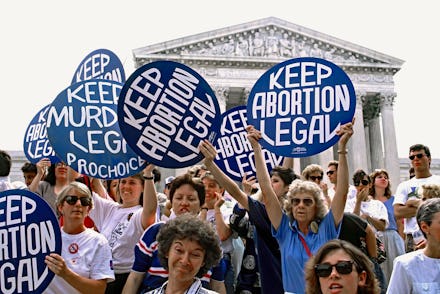The Supreme Court is poised to begin rolling back 'Roe v. Wade' abortion rights

The Supreme Court on Monday agreed to hear a potentially critical case on abortion rights, raising alarms that the lopsidedly conservative bench may be on the cusp of eroding the reproductive rights granted by the 1973 Roe v. Wade decision. The case, Dobbs v. Jackson Women's Health, centers on a 2018 Mississippi law that would bar people from terminating their pregnancies, even during the extreme early stages of pregnancy in which the fetus would have no viable chance for survival outside the womb.
Lower courts had already blocked the law, setting up the SCOTUS decision to hear the case. Crucially, the case asks broadly "whether all pre-viability prohibitions on elective abortions are unconstitutional." In other words, by agreeing to hear the case, the Supreme Court would not simply be ruling on Mississippi's proposed anti-abortion restrictions, but whether it's legal to bar people from terminating "pre-viability" pregnancies in general.
Mississippi had initially petitioned the Supreme Court to take up the case last year, but the court pointedly abstained from wading into the thorny issue of a pregnant person's right to choose — until now. "[Dobbs is] the best opportunity the Supreme Court will ever have to overturn Roe," Ed Whelan, a conservative legal scholar, told the Los Angeles Times.
In no small part, that opportunity is the result of former President Donald Trump's appointment of Justice Amy Coney Barrett to replace the late Ruth Bader Ginsburg this past fall. Barrett, a virulent abortion opponent, has referred to abortions as "always immoral." Despite her pledge during her nomination hearings that "my views on this or any other question will have no bearing on the discharge of my duties as a judge," she now joins Trump-appointed Justices Brett Kavanaugh and Neil Gorsuch who, prior to her appointment, authored a dissent in favor of abortion restrictions in Louisiana.
The court's decision to hear arguments in Dobbs prompted an immediate outcry from a host of reproductive rights groups.
"Alarm bells are ringing loudly about the threat to reproductive rights. The Supreme Court just agreed to review an abortion ban that unquestionably violates nearly 50 years of Supreme Court precedent and is a test case to overturn Roe v. Wade," Center for Reproductive Rights President and CEO Nancy Northup said in a statement following the court's announcement.
"The consequences of a Roe reversal would be devastating. Over 20 states would prohibit abortion outright," Northup continued. "Eleven states — including Mississippi — currently have trigger bans on the books which would instantaneously ban abortion if Roe is overturned. Already, abortion is nearly impossible to access for people in states like Mississippi, where lawmakers have been chipping away at the right to abortion for decades. We will keep fighting to make sure that people do not lose this fundamental right to control their own bodies and futures."
Last year, Clare Busch reported for Mic on the volunteers who help escort patients into the Jackson Women's Health clinic in Mississippi, shielding them from the screams of anti-abortion protesters. You can read that story here.